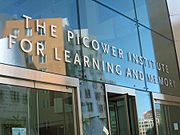
Picower Institute for Learning and Memory
Encyclopedia

McGovern Institute for Brain Research
The McGovern Institute for Brain Research is a research institute within MIT. Its mission is to understand how the brain works and to discover new ways to prevent or treat brain disorders...
and the Department of Brain and Cognitive Science
Cognitive science
Cognitive science is the interdisciplinary scientific study of mind and its processes. It examines what cognition is, what it does and how it works. It includes research on how information is processed , represented, and transformed in behaviour, nervous system or machine...
s, one of the three neuroscience
Neuroscience
Neuroscience is the scientific study of the nervous system. Traditionally, neuroscience has been seen as a branch of biology. However, it is currently an interdisciplinary science that collaborates with other fields such as chemistry, computer science, engineering, linguistics, mathematics,...
groups at MIT. The institute is focused on studying all aspects of learning and memory; specifically, it has received over US$50 million to study Alzheimer's, schizophrenia
Schizophrenia
Schizophrenia is a mental disorder characterized by a disintegration of thought processes and of emotional responsiveness. It most commonly manifests itself as auditory hallucinations, paranoid or bizarre delusions, or disorganized speech and thinking, and it is accompanied by significant social...
and similar diseases.
When it was established in 1994, the institute was primarily funded by the Sherman Fairchild Foundation
Sherman Fairchild Foundation
The Sherman Fairchild Foundation, founded in 1955, is a charitable foundation of Sherman Mills Fairchild, founder and chairman of many Fairchild Corporations. Fairchild formed two charitable Foundations, the Fairchild Foundation and the Sherman Fairchild Foundation during his lifetime...
, the RIKEN Brain Science Institute
RIKEN Brain Science Institute
RIKEN Brain Science Institute, often abbreviated as RIKEN-BSI, is a non-profit research institute focusing on neuroscience located in Wakō city, Saitama Prefecture in greater Tokyo area, Japan. It was established to lead the field of neuroscience in 1997 as one of institute in RIKEN...
and the National Institute of Mental Health
National Institute of Mental Health
The National Institute of Mental Health is one of 27 institutes and centers that make up the National Institutes of Health...
. It was renamed after a massive grant by the Picower Foundation in 2002, the eponymous charity group funded by profits from Bernard Madoff's ponzi scheme
Bernard Madoff
Bernard Lawrence "Bernie" Madoff is a former American businessman, stockbroker, investment advisor, and financier. He is the former non-executive chairman of the NASDAQ stock market, and the admitted operator of a Ponzi scheme that is considered to be the largest financial fraud in U.S...
.
On July 1, 2009, Professor Li-Huei Tsai became the director of the Picower Institute. The institute was directed by founder and Nobel Prize
Nobel Prize
The Nobel Prizes are annual international awards bestowed by Scandinavian committees in recognition of cultural and scientific advances. The will of the Swedish chemist Alfred Nobel, the inventor of dynamite, established the prizes in 1895...
laureate Susumu Tonegawa
Susumu Tonegawa
Susumu Tonegawa is a Japanese scientist who won the Nobel Prize for Physiology or Medicine in 1987 for his discovery of the genetic mechanism that produces antibody diversity. Although he won the Nobel Prize for his work in immunology, Tonegawa is a molecular biologist by training...
until he resigned on December 31, 2006, motivated by his belief that “a new generation of leadership is needed.”

